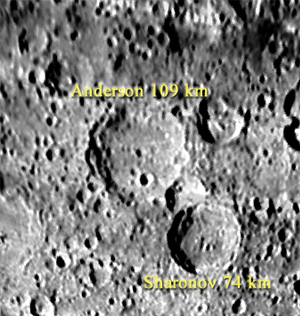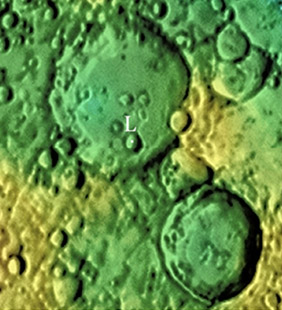Difference between revisions of "Anderson"
| Line 4: | Line 4: | ||
| Lat: 15.8°N, Long: 171.1°E, Diam: 109 km, Depth: km, Rükl: ''(farside)''<br /> | | Lat: 15.8°N, Long: 171.1°E, Diam: 109 km, Depth: km, Rükl: ''(farside)''<br /> | ||
|} | |} | ||
| − | [http://www.lpod.org/coppermine/displayimage.php?pid=4102&fullsize=1 [[Image: | + | [http://www.lpod.org/coppermine/displayimage.php?pid=4102&fullsize=1 [[Image:Andersons.jpg|andersons.jpg]]]]] [[Image:Anderson-color.jpg|anderson-color.jpg]][[Image:Anderson.jpg|Anderson.jpg]]<br /> left: ''[http://www.lpi.usra.edu/resources/lunar_orbiter/images/img/ii_034_m.jpg II-034-M]'', middle: ''[http://planetarynames.wr.usgs.gov/images/Lunar/lac_68.pdf USGS Color-coded LAC 68]''. The crater lies within the ~ 600 km-wide [http://the-moon.us/wiki/Freundlich-Sharonov%20Basin Freundlich-Sharonov] basin which is Pre-nectarian in age (4.6 - 3.92 bn years ago), and there are several other smaller craters within '''Anderson'''. There is a note in [http://en.wikipedia.org/wiki/Anderson_(crater) Wikipedia] referring to one of these, '''Anderson L''', as the 'Anderson Finger'; however, why this is so has yet to be clarified.<br /> right: '''''LROC'''''<br /> <div id="toc"> |
==Images== | ==Images== | ||
Latest revision as of 18:43, 15 April 2018
Contents
Anderson
| Lat: 15.8°N, Long: 171.1°E, Diam: 109 km, Depth: km, Rükl: (farside) |
 ]]
]] 

left: II-034-M, middle: USGS Color-coded LAC 68. The crater lies within the ~ 600 km-wide Freundlich-Sharonov basin which is Pre-nectarian in age (4.6 - 3.92 bn years ago), and there are several other smaller craters within Anderson. There is a note in Wikipedia referring to one of these, Anderson L, as the 'Anderson Finger'; however, why this is so has yet to be clarified.
right: LROC
Images
LPOD Photo Gallery Lunar Orbiter Images Apollo Images
Maps
(LAC zone 68A1) USGS Digital Atlas PDF
Description
Description: Wikipedia
Additional Information
Nomenclature
- Named for John August Anderson (August 7, 1876 - December 2, 1959), an American astronomer. In 1916 he went to work at the Mt. Wilson observatory. His most notable contribution was his adaptation of the Michelson's interferometer technique for measuring close double stars. He used a rotating mask at the focus to measure the separation of Capella.
- Not to be confused with Andersson or M. Anderson!
- Anderson was printed as Andersen on the farside map of Hallwag.- DannyCaes Dec 2, 2011
- Anderson Finger (Anderson L).
LPOD Articles
Bibliography
J. A. Anderson in popular scientific literature:
Page 261 of Burnham's Celestial Handbook (Volume 1).
Note:
Page 275 (also in Burnham's Celestial handbook) has a certain T. D. Anderson from Edinburgh, Scotland (an amateur astronomer who discovered Nova Aurigae 1891, also known as T Aurigae, and Nova Persei 1901). - DannyCaes May 3, 2015